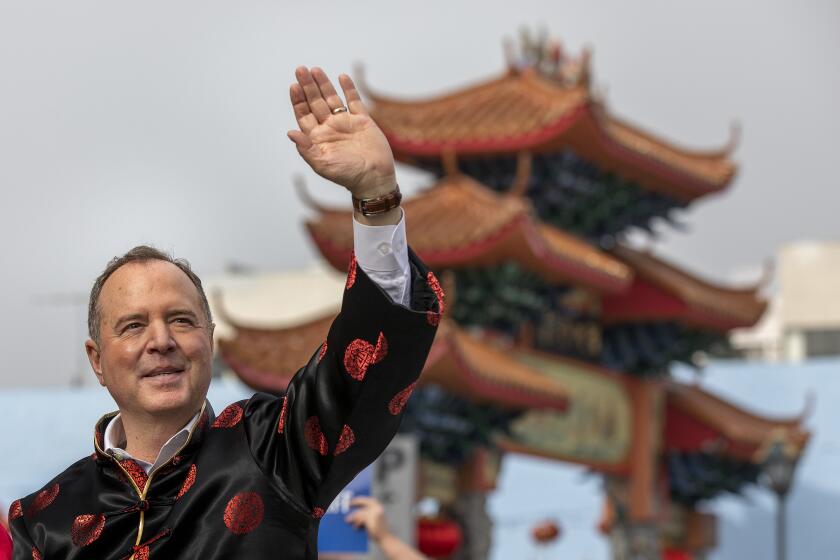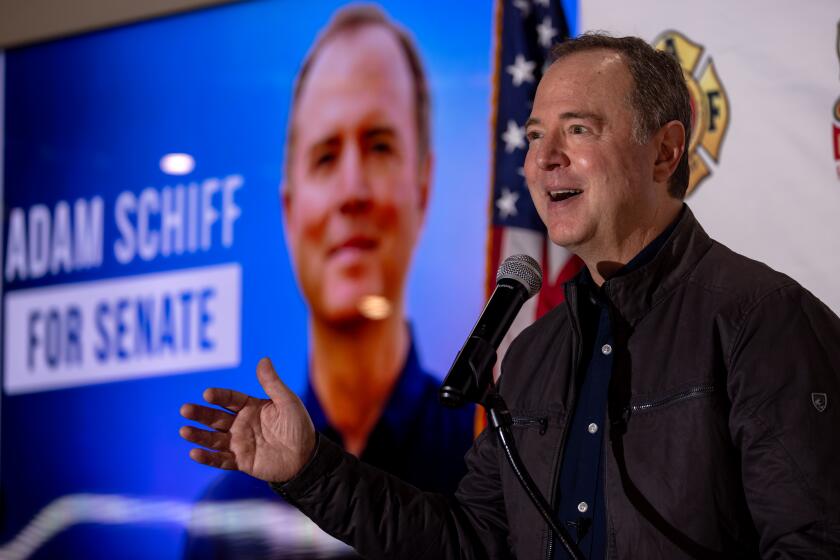Katie Porter is nearly done with Congress. But she’s not finished yet

- Share via
Katie Porter is seated at Starbucks, nursing an iced coffee and discussing might-have-beens as a stream of customers in seasonal uniform — shorts, flip-flops — flows steadily past.
This is not how she hoped to spend her summer.
The Orange County congresswoman had gone from unknown to political celebrity virtually overnight, wielding a whiteboard and marking pen to skewer lobbyists, torment chief executives and harry various corporate heavies — to the utter rapture of the online, cable-TV-consuming wing of the Democratic Party.
She transformed herself from UC law professor into a fundraising dynamo, a progressive heroine and oft-discussed prospect for higher office. Then it all came crashing down as Porter lost, badly, in a fractious Senate primary to fellow Rep. Adam B. Schiff. Now he’s the one cruising to election and potential lifetime tenure in Washington, as Porter confronts the end of her congressional career a few short months from now.
She has, Porter says, no regrets.
Not for how she waged her Senate campaign. Not for yielding the national political platform she built. Not for walking away from a House seat — which Republicans are eagerly eyeing — after three terms and six years in Washington, a point when many in her line of work are just getting started.
“What in the universe do I wish was different?” Porter asked, before answering herself. “A lot. A lot.”
The war in Gaza, for instance, which activated a peace movement in the Democratic Party and bolstered the candidacy of Rep. Barbara Lee, Porter’s main competition for liberal support against the more centrist Schiff.
“Do I think I underestimated some factors and overestimated some others? Sure. Do I think that there were calculations and calculuses that I made? Yes,” Porter went on. “But when I look at that campaign, I don’t think there was ... a particular moment or a particular decision that shaped it either way.”
The Burbank congressman has been the pacesetter in California’s U.S. Senate race. As rivals campaign on passion and presence, the Democrat’s appeal is his practicality.
The morning rush had petered out. An egg-and-spinach wrap sat before Porter, untouched.
She’s still smarting over the millions of dollars in negative advertising the crypto industry and tech bros dumped on her head to help Schiff. But, she says, her endorsement of her erstwhile rival is wholehearted and sincere.
“Adam and Barbara and I remained very cordial throughout the race,” Porter said. “We saw each other every day at work. People forget that. We’re sitting in delegation meetings together; we’re on the airplane together. One of the first people I saw after I lost was Barbara Lee’s son, who was like, ‘You ran a great race.’ We understand that when you run, someone wins and someone loses.”
Her one hope for Schiff is that he uses the fall campaign (such as it is against his handpicked opponent, the hapless Republican Steve Garvey) to talk about some of the many issues facing California.
“We need a real policy debate in California,” Porter said. “We have a narrative about California being [Gov. Gavin Newsom’s] golden California dreaming, but also people who are like, ‘This is a failed state; people are leaving’ — that whole narrative. ... This race was a chance to have a real policy debate about our state, and I don’t think that happened.”
Blame the short attention span of voters. Blame a diminished political press corps. Blame a contest that managed to captivate very few Californians. Blame hairsplitting among generally like-minded Democrats and the lack of any real GOP competition to spur a deep and meaningful discussion.
Even as Schiff coasts to election, Porter said: “I hope Adam will go back to some of the policies that were really important in the Senate race — whether that was housing, whether that was the environment, energy, whether that was taxes — and try to have some of those conversations and arrive in the Senate really willing to think about ‘What does California need from Washington?’”
Barabak: Northern California is losing its political dominance, and Adam Schiff’s victory proves it
Any regional advantage has apparently been wiped away by the nationalization of politics, the everywhere reach of social media and, especially, the star-making capacity of TV news.
A customer approached Porter, wide-eyed, to offer good wishes. The 47th Congressional District, which runs along the Orange County coast, is home to one of the most competitive House races in the country, a fight pitting Democrat Dave Min against Republican Scott Baugh to replace Porter on Capitol Hill.
She has few illusions about the institution she’s leaving behind.
Congress is a lumbering beast of a place, deeply polarized and highly antagonistic, and Porter said there’s little desire by leaders of either major party to fix that.
“My colleagues want to talk — and you will hear them talk this fall, whether it’s Congressman Schiff running for the Senate, or a House candidate or Vice President Harris — they want to talk endlessly about the crisis of confidence in the Supreme Court,” Porter said. “What about the crisis of confidence in us, in Congress, and who we work for and how effective we are? That’s a conversation worth having, too.”
(There’s a reason Porter was no favorite of former House Speaker Nancy Pelosi, who threw her considerable clout behind Schiff in the Senate primary.)
For now, Porter is looking forward to returning to the classroom in January — her face lit up at the mention of standing in front of students again — taking up her old position at UC Irvine. She’ll teach a first-year law class and courses on commercial law and legislation.
She has a new Burmese kitten, Dino, and a basset hound puppy, Poppy. As a single mom of three children, she’ll gladly forsake the arduous cross-country commute to Washington, and also looks forward to being around when her kids get home from school.
A sip of coffee. Another passerby — a woman in a neon-green safety vest — bids Porter well.
After outfoxing several prominent Democrats in the March Senate primary, Republican Steve Garvey has been very quiet. Except for his visit to Israel.
She hasn’t ruled out a future run for statewide office — Porter could be a formidable candidate for attorney general or governor — but feels no haste to decide. (By contrast, she was the first to jump in to the Senate race, even before the late Sen. Dianne Feinstein had stated her intention to step aside.)
Porter reprimanded the nearly half dozen gubernatorial hopefuls who’ve already launched their campaigns.
“Between now and election day, in my opinion, nobody should be campaigning for governor,” Porter said. Democrats, quite rightly, insist that Donald Trump poses an existential threat to democracy and that the party must do all it can to stop him.
“If you believe that” — here Porter brandished a fist — “then that’s what we should all be working on right now.” Not jockeying in an election still more than two years off.
At 50, still in the blush of youth by today’s silvered political standards, Porter has plenty of highway ahead of her.
She remains committed, she said, to public service of some sort.
“I’m not tired at all of being a candidate. I’m not tired of campaigning,” she said, finally turning attention to her neglected spinach wrap. “But I just don’t know what that looks like, and I’m not gonna be rushed.
“I’m going to look for the thing that feels right, whether that’s elective office — I don’t know at what level — whether that’s administration, whether that’s some kind of civil service board position in California,” or possibly a role in a Kamala Harris administration.
Her brief, ascendant House career may be nearly over. But, Porter suggested, she’s not through yet.
More to Read
Get the latest from Mark Z. Barabak
Focusing on politics out West, from the Golden Gate to the U.S. Capitol.
You may occasionally receive promotional content from the Los Angeles Times.














